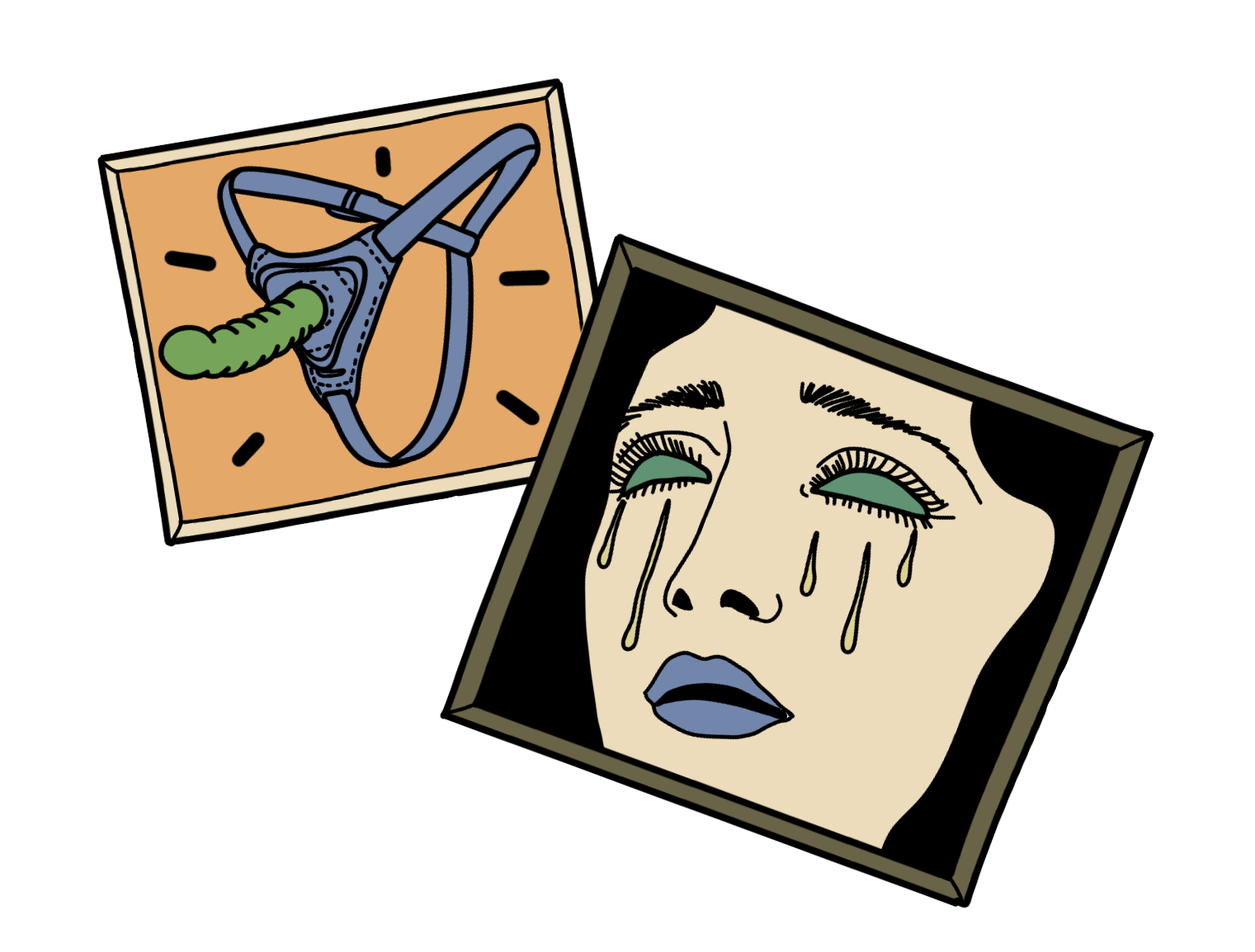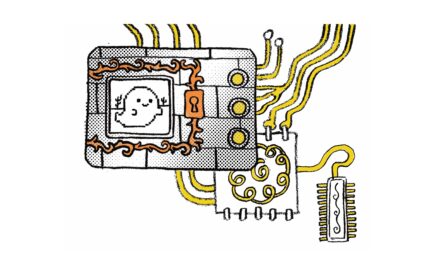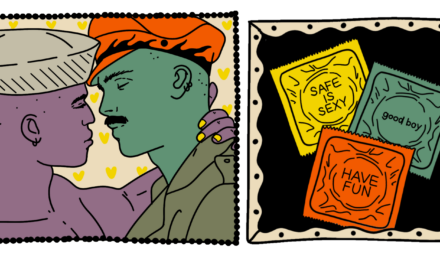
© Illustration Dunia Ciuferri
It had been 2 days since I arrived in Vienna’s 1st district, the ‘Innere Stadt’ as they call it, to meet her. The heart of the old city pulses with timeless elegance. Cobblestone streets whisper history beneath grand facades. The air felt alive with promises of a good time when I arrived, and it kept getting more alluring in her presence. I didn’t yet know I was about to fall in love with an incredible Capricorn lady I had met in Amsterdam just a month before. She was a senior board member at my job, 12 years older than me, and just absolutely stunning. Her Kiwi roots tainted her skin in a caramel hue. The skin she covered partly in tribal New Zealand tattoos that accentuated her red short haircut.
I was 21 and straight -to my then naivete- when I first saw her and the concept of ‘love at first sight’ became less of a myth and closer to reality. Fast-forward a month, in typical lesbian fashion, I was dragging my suitcase into her apartment. There was a bike pinned on the wall and that was only the beginning of all the ways she would surprise me. After a day of sightseeing and giggling, we finally slept together.
One day after diving into queer waters, my travels took me to new heights.
As the evening fell, we laid in bed, flipping through some forgettable magazines, -their contents destined to fade-, while the moments that followed would etch into my mind forever.
Our bodies danced an intimate dance, fierce and tender at once, when all of a sudden as I climbed the ladder of climax, a pocket of ecstasy burst, rippling warm waves of energy throughout my whole body, opening me through the chest, softening all over when I unexpectedly broke down in tears.
From one breath to the next, what was pleasurable rising, became an uncontrollable fall into a sort of void.
It felt as though I had sipped in a cocktail of relief, sorrow, and wonder. On the surface, it felt like a huge release, like the gates of a dam breaking open for the first time in one’s lifetime, for some long-awaited flow. Yet on a deeper level, her touch had unlocked something buried within me, something I hadn’t known existed until it broke free. I hadn’t realized how much I needed to share intimacy with someone who truly saw me and to feel everything I had kept hidden. The grief of letting men inside me who didn’t respect me. The ache of never being touched in ways that made me feel truly seen, or appreciated before. Yet also, shedding tears not of sadness alone, but of awe, as if my body was finally remembering its worth.
Coming, in some sense, truly home.
It’s not been uncommon to meet people with similar post-coital experiences, yet no one really talks about it. So here’s my view on the different layers to this phenomenon:
THE RELEASE
Psychologically, sex can act as a catharsis, a gateway for emotions buried deep within. In this space, the walls of emotional suppression can crumble, allowing tears to flow as a form of healing release. Unresolved feelings of stress may surface in moments of intimacy, even more so for those who tend to repress emotional expression in daily life. Sex then serves as the perfect container for release; an energetic reset.
THE GRATITUDE
Sex is more about acceptance than we give it credit for. At its most profound, it is an act of surrender.
Forget what hookup culture has us believe, there is something deeply profound about trusting someone to take you where sex does. To the space where you release the grip you hold onto control over your faculties, and are met with acceptance of every raw expression, and bodily secretion, where desires are embraced without any restrictions.
How could we not cry at the unique experience of being fully witnessed and allowed. Every cell of our bodies revels in this act of trust, with gratitude, in awe. A treasure for seeking hands.
Crying after sex speaks to the unparalleled vulnerability of intimacy. To be deeply seen and safe in the arms of another is a profound experience.
THE SADNESS
Crying after sex is sometimes about the impact of falling back to a familiar low after the climax of orgasm. A return to the baseline, which for many is, sadly, a usual low. It’s a comedown from euphoria to the ordinariness of life, an unavoidable reckoning with reality that forces us to face the impermanence of our journey.
On a separate level, the necessary surrender during sex -the act of truly letting go- carries an inherent sense of loss that can evoke sadness. To allow oneself to be vulnerable, to strip away defenses and drop the layers of control we hold so tightly, is both liberating and disarming. In this moment of surrender, we relinquish not only control but also the protective barriers we use to shield ourselves from the world.
Known in French as ‘’Dysphorie post-coïtale’’, this phenomenon can be deeply emotional, physical, and existential. Crying after sex, in this context, becomes a natural outpouring of the depth and complexity of such an experience. It is the body’s and soul’s way of processing both the joy and grief of surrender.
The French phrase ‘’la petite mort’’, or “the little death,” refers popularly to orgasm itself, yet it captures the existential quality of this experience. Orgasm is a moment of surrender, a temporary dissolution of the concept of self as we know it, and the control we exert over our being, a relative loss of consciousness.
After reaching such a peak, tears may follow as a response to the fleeting nature of the moment, a bittersweet reminder of our mortality, the impermanence of life, and the beauty of it all.
THE BIOLOGY
On a biological level, there’s a dance happening between oxytocin, endorphins, and prolactin which are hormones that flood the body during and after sex. These neurochemicals are responsible for feelings of connection, relaxation, and satisfaction, yet they can also make us more vulnerable and open, triggering an emotional outpouring.
Orgasm triggers a surge of dopamine in the brain’s reward pathways, producing intense euphoric pleasure. However, as the dopamine level drops below baseline post-climax, feelings of depression, low energy, and emotional discomfort, much like withdrawal from drugs may emerge. Additionally, the deactivation of emotional centers like the amygdala during orgasm can create space for deep, often repressed emotions to surface right after.
The surge in prolactin then follows, providing a sense of sexual satiation and inhibiting further sexual drive. This neurochemical shift helps explain why people may feel the blues after sex, as prolactin suppresses the reward pathways that had been activated during the sexual act.
Along with that, a decrease in androgen receptor activity, which in turn further contributes to a drop in dopamine, amplifies the emotional dip, potentially triggering tears, as the body transitions from the heightened arousal state to a more subdued, reflective one.
Crying after sex is the bridge between arousal and calm. Crying helps regulate emotions by releasing stress hormones like cortisol through tears, reducing physical tension, and activating the parasympathetic nervous system to induce a sense of calm, alleviating tension, and finally guiding the body back to a state of balance.
Ultimately, crying after sex is a deeply human acknowledgment of the paradox of intimacy, its ability to make us feel both joyous and sad. By normalizing it as one facet of sex and intimacy; we affirm its raw beauty and embrace our shared humanity. Sex is not just an act of pleasure but a transformative exchange.




